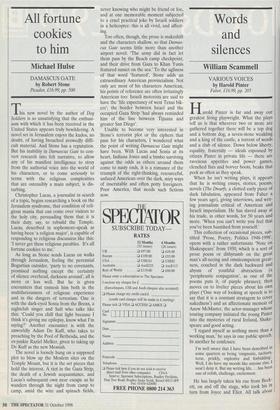All fortune cookies to him
Michael Hulse
DAMASCUS GATE by Robert Stone Picador, £16.99, pp. 500 This new novel by the author of Dog Soldiers is so unsatisfying that the enthusi- asm with which it has been received in the United States appears truly bewildering. A novel set in Jerusalem enjoys the kudos, no doubt, of having broached avowedly diffi- cult material. And Stone has a reputation. But his inability in Damascus Gate to con- vert research into felt narrative, to allow any of his manifest intelligence to stray from the authorial voice into the world of his characters, or to come seriously to terms with the religious complexities that are ostensibly a main subject, is dis- turbing.
Christopher Lucas, a journalist in search of a topic, begins researching a book on the Jerusalem syndrome, that condition of reli- gious mania that can come over visitors to the holy city, persuading them that it is their duty, say, to rebuild the Temple. Lucas, described in sophomore-speak as having been 'a religion major', is capable of responding to religious discussion like this: `I never get these religious parables. It's all fortune cookies to me.'
As long as Stone sends Lucas on walks through Jerusalem, feeling the perennial Bogartian outsider, 'party to no covenants, promised nothing except the certainty of silence overhead, darkness around', all is more or less well. But he is given encounters that enmesh him both in the multifariousness of religious experience and in the dangers of terrorism. One is with the dark-eyed Sonia from the Bronx, a nightclub singer and Sufi who talks like this: 'Could you chill that light because I think it's giving me epilepsy, know what I'm saying?' Another encounter is with the unworldly Adam De Kuff, who takes to preaching by the Pool of Bethesda, and the ex-junkie Raziel Melker, given to taking up De Kuff as the new Messiah.
The novel is loosely hung on a supposed plot to blow up the Moslem sites on the Temple Mount, but it is the set pieces that hold the interest. A riot in the Gaza Strip, the death of a Jewish acquaintance, and Lucas's subsequent own near escape as he wanders through the night from camp to camp, amid the wire and spinach fields, never knowing who might be friend or foe, and at one memorable moment subjected to a cruel practical joke by Israeli soldiers in a helicopter: this is all vivid, and affect- ing.
Too often, though, the prose is makeshift and the characters shallow, so that Damas- cus Gate seems little more than another airport novel: 'The army did in fact let them pass by the Beach camp checkpoint, and their drive from Gaza to Khan Yunis featured sunset on the sea.' To the ugliness of that word 'featured', Stone adds an extraordinary American provincialism. Not only are most of his characters American, his points of reference are often irritatingly American too: Israeli motorists are said to have the 'life expectancy of west Texas bik- ers'; the border between Israel and the occupied Gaza Strip 'had always reminded him of the line between Tijuana and greater San Diego'.
Unable to become very interested in Stone's terrorist plot or the ciphers that pass for his characters, I wondered what the point of writing Damascus Gate might have been. With Lucas and Sonia at its heart, Indiana Jones and a bimbo surviving against the odds as others around them come to nasty ends, it is a romance of the triumph of the right-thinking, resourceful, unfazed American over the dark, miry ways of inscrutable and often potty foreigners. Poor America, that needs such fictions now.


















































































 Previous page
Previous page